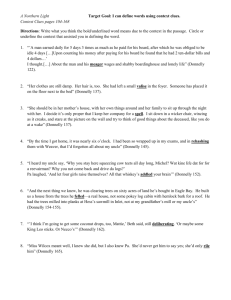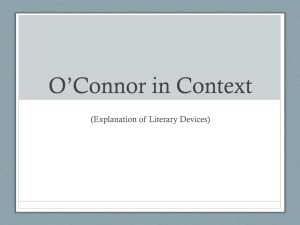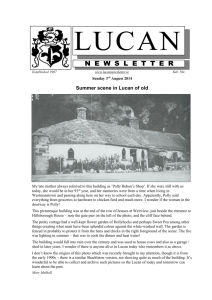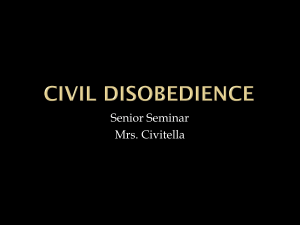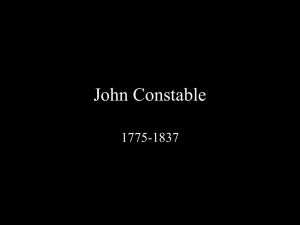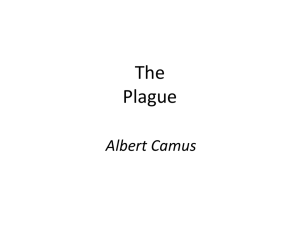Black Donnellys - Thames Valley District School Board
advertisement
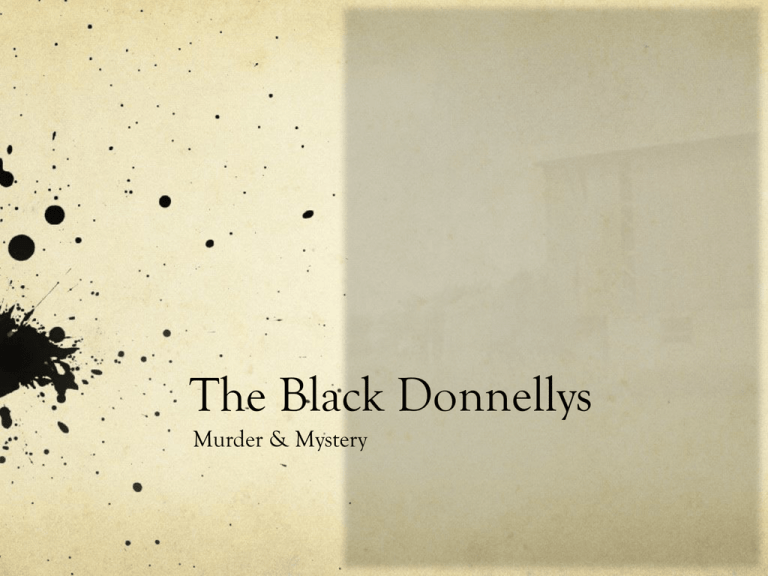
The Black Donnellys Murder & Mystery Review: Irish Potato Famine: 1845 to 1849 Starting in 1845, Ireland was struck with a massive potato famine caused by a fungus in the potato. So many people relied on potatoes that when the potatoes got infected, disaster struck During this time, Ireland went through a massive famine where 1 in 8 people died of starvation and 1 in 8 left the country Many Irish came to Canada and settled in what is now Ontario Meet The Donnellys James and Judy were married in Ireland in 1840, just a few years before the famine While in Ireland, they had their first son, James Jr. They were a farming family, and when they were faced with the Irish potato famine, the family came to Canada hoping to start again The Donnellys Come To Canada They settled down in a town called Biddulph, near the village of Lucan The Donnelly’s were Irish Catholics, and the majority of families in the Lucan area were Protestants. The Donnellys tried to be friendly to both Protestants and Catholics, but in Lucan the two were feuding As a result, the Donnellys were disliked by both sides Finding Their Home The Donnelly family could not afford any land, and instead chose to squat on a settlement in Lucan Once they set up their home they had seven additional children (total of seven boys, one girl) Brawl With Patrick Farrell A number of squabbles ensued in which other settlers such as Patrick Farrell became embroiled. At one point James shoots at Farrell to get him off his land During a neighbourhood logging activity in 1857, James Donnelly Sr. gets drunk off liquor and killed Patrick Farrell during a brawl James Donnelly goes into hiding, and a $400 reward is put up for his arrest Turning Himself In James Donnelly tries to remain in hiding by staying in his own home and wearing his wife’s clothes After killing Patrick Farrell, the Donnellys adopted his son and swore to raise him James turned himself in and was sentenced to death, but the family started a petition to reduce the sentence to seven years in the Kingston Penitentiary. Consider If you lived in Lucan, what would your impressions of the Donnellys be? Conflicts Brew In 1869, William is charged with theft by a respected town member, but due to a lack of evidence he is later found not guilty Later in 1869, James Jr. and William are charged with robbing the post office. They are also later found not guilty due to a lack of evidence and witnesses The Donnelly family becomes very verbally aggressive, and is seen in town swearing at people and police Donnelly Barn is Burned Down In the middle of summer in 1870, the Donnelly barn suddenly caught on fire The barn had in it stocks of Donnelly crops The cause of the fire was never truly discovered Business Opportunities After losing their barn, the Donnellys get involved with a Stage Line business, a business that transported materials The Donnellys were seen as a rough group, and they soon became fierce rivals with the other stage lines It’s not sure who started the rivalry, but carriages were burned and horses killed on both sides Violence Increases Eventually, the Donnellys muscled out the competition, but in doing so they begin to upset the law and everyone else in the town Soon, a feud grew between the town and the Donnellys Many in the town begin to accuse the Donnellys of crimes from years ago, but they are found innocent Eventually, even the police begin to accuse the Donnellys of crimes they didn’t commit Crimes & Allegations 1875 Joseph Berryhill challenges the Donnellys to a fight. The Donnellys end up being charged with assault, and Thomas is convicted 1875 James Curry claims that James Jr. and Thomas Donnelly attack and rob him. Nothing comes of the charge. 1877 Violence in Lucan increases. There are a number of fires. The Donnellys’ stables and stages are burned, as is Michael Donnelly’s home. The Donnellys’ are the only ones blamed for any fires 1878 Constable Samuel Everett claims someone fires a shot at him. He says the guilty party is Robert Donnelly and Robert is sentenced to two years in the Kingston Penitentiary. 1879 Constable Everett confesses that he is not certain that it was Robert Donnelly who shot him. Robert remains in prison Consider Decide how the town of Biddulph should deal with the Donnellys. Create an action plan. A New Hope A new catholic priest, Father Connolly, moved to Biddulph in 1879. After hearing of the Donnellys, he decides to try and solve the problem He creates the Peace Society, an organization dedicated to peace in Biddulph One of the major conditions is that people have to be willing to have their homes searched for stolen property The Donnellys Refuses The Donnellys decide not to join the Peace Society Some members of the Peace Society form their own group, the Vigilance Committee, and are led by a constable of Biddulph When a cow goes missing, the Vigilance Committee sneaks onto the Donnellys property to look for the cow The cow is found, the committee is charged with trespassing, they are found not guilty Vigilance Committee The Committee swears they will get the Donnelly family out of Lucan Not long after this, their son Michael is stabbed and killed by a local Lucan, who is sent to jail When some barns burn down January 1880, James Sr. and Judy Donnelly are blamed and a trial is set for Feb 4th They protest the idea, claiming they are blamed for everything The Vigilance Committee decides to take things into their own hands February 3rd, 1880 A young boy named Johnny O’Connor is set to take care of the animals while the Donnellys go to trial The Vigilance Committee has decided that they want to take this Donnelly problem into their own hands, and they form a mob that marches on the Donnelly home The mob is led by the Constable of Biddulph The Donnelly House In the house is James Sr. and Judy, their son Tom and their niece Bridgette with Johnny O’Connor The mob approaches the home at around 1am, and the constable quickly handcuffs Tom before he is fully awake The rest of the family wakes up to question what right the constable has to enter their house, when the mob rushes in No one in the mob notices Johnny O’Connor, who hides under a bed The Massacre ► Johnny sees the mob kill James Sr. and Judy with farming equipment, while Tom tries to get away ► The mob catches Tom and drags him back in the house, where Johnny sees them try to beat his skull open ► Bridgette is upstairs, and so Johnny only hears of her murder ► The crowd leaves and lights the place on fire The Wrath Continues Johnny O’Connor is able to sneak out of the house before the fire consumes it, and on his way he sees the bodies of Judy, James, and Tom The mob continues to the Donnelly’s son William’s house, where John is staying with William The mob surrounds the house and shouts “Fire, Fire”, in an attempt to wake up William Mistaken Identity John gets up to see what is going on, and members of the mob think he is William Someone in the mob shoots John, and John falls dying on the ground The mob, thinking themselves victorious cause some trouble outside and then leave Williams home William is forced to watch his brother die The Day After ► In the morning, several town members return to the Donnellys’ house and steal souvenirs. ► By the time the coroner arrives, most of the bodies have been stolen ► The thirteen year old boy, James O’Connor, comes forward to tell his story with William Donnelly ► Thirteen people are arrested based off their testimony Decide After the massacre of the Donnellys, the remaining family decides to have a funeral, but the town is split on the funeral Should the deaths of the Donnellys be celebrated or mourned? Give a reason why. The Trial There was a lot of controversy surrounding the trial for the murder of the Donnellys In order to secure a verdict of guilty, the prosecutor would need to provide enough believable evidence to convince the jury that the men arrested were responsible The jury was to be taken from the local area Consider Based on what you know, why would it be hard to prove the killer guilty? Reasons a Conviction was Difficult It was difficult to find an impartial jury Because Johnny O’Connor was thirteen, his testimony wasn’t accepted Since it was night, it was believed that William didn’t get a very good look at the mob and so he wasn’t fully believed The jury could not decide, and so no conviction was made ON April 13th, 1880, the O’Connor family home is burnt to the ground Changing The Venue The Globe still continues to raise an outcry to the effect that London and Middlesex are unable to produce twelve men sufficiently honest capable and impartial to try the persons accused of being engaged in the Donnelly murders. Seeing that our contemporary has been engaged in lowering public estimation in the credibility of the chief witnesses of the Crown, it is clear that Toronto is about as bad a place as could be selected for the trial. Besides, Mr. Mowat has just offered a rewards of $4,000 for such evidence as may be "hereafter" given as will lead to the conviction of the murderers. This is a tacit admission that the evidence thus far obtained is not sufficient to ensure conviction, no matter where the trial may be held. We entirely dissent from the Globe when it says: "We are firmly of the opinion that as impartial jury cannot be got in Middlesex, and that the community will not be satisfied with the result of a trial in London. The prisoners could neither be condemned nor acquitted there without causing a great many people to suspect that justice had been disregarded." Changing The Venue No opinions that have been expressed in London or in Middlesex have been so adverse to the success of the Crown in this important case as those whish have appeared in the Globe , which has depicted the chief witness, William Donnelly as not worthy of credence, and that the boy O'Connor has been "stuffed." The Toronto paper was never very favorable to London, but the adverse opinion it now expresses, the allegation that an impartial jury cannot be found here or in the adjoining county, comes but awkwardly from a journal that has been teaching the people throughout Ontario that the Crown witness cannot be relied upon. Source: "Changing the Venue," London Free Press, March 23, 1880. The Second Trial A second trial was begun, one that brought in the Peace Society up to and including the Father Connolly Some of the killers who had felt bad about the murder were paid off by the Peace Society to leave Biddulph for Michigan, but the prosecutors used the law to have them brought back to Biddulph to stand trial Again, the jury was hung Life After The Trials When the second trial drew to a close, four of the eight Donnelly children remained alive. Patrick and Jenny moved away from Lucan and left the family troubles behind. William and Robert, however, remained entangled in the affairs of Lucan and area, becoming both lawmakers and lawbreakers. William never forgot the atrocities his family suffered that fateful night. In 1893 he wrote the Exeter Times to remind everyone that the crime was always on his mind. In fact, he wrote, “some of the broken and wasted bones of my family are still in my possession and will be until justice is fully done.” Trying To Forget After the murder, much of the town of Lucan tried to move on In 1954 a book entitled “The Black Donnellys” was released. A Second Book, “The Donnellys Must Die” is released 1964 The book was the first popular retelling of the story, and it began to attract a lot of interest in Lucan n 1964, the town of Lucan changed the Donnelly Tombstone Eerie Rumours Rumour has it that the street the Donnellys lived on, the Roman Line, is haunted, and that horses won't venture down it on the night of February 3rd & 4th, the anniversary of the Donnelly massacre. If they do, death will follow. And, that's apparently what happened to three horses who did . . . they died soon after their nocturnal excursion down the cursed road Eerie Rumours Another rumour suggests that some horses refuse to pass the old Donnelly property . . . period . . . at any time of the year. It's said that their riders have had to walk the skittish beasts past the homestead before continuing down the Roman Line. There's tales of headless horses seen galloping throughout Biddulph Township, and of course, the more popular legend of horses going berserk and running around mad as if suddenly possessed. Robert and Noreen Norton, who bought the Donnelly Homestead in 1974, and moved in with their three children, witnessed this strange phenomenon first hand
